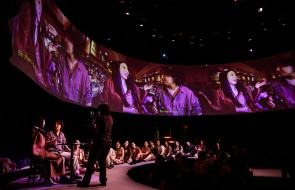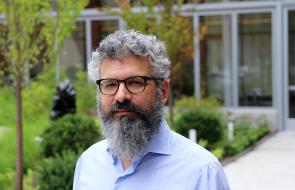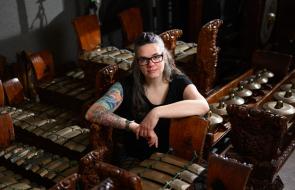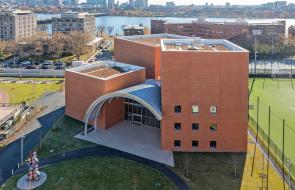April 20, 2022
Arts at MIT reporting full story here.
Srinivasan Raghuraman gets a long-awaited moment in the spotlight

Image credit: Danny Goldfield
The PhD alum, who works as a research scientist at Visa Research, performed his Emerson/Harris solo recital after a two-year delay.
Srinivasan Raghuraman was in the lab after hours during his first year at MIT when he heard another student singing Mozart. Raghuraman, who had taken up piano during his undergraduate studies at Indian Institute of Technology, was especially fond of the Austrian composer and approached his classmate to ask what he was rehearsing. That’s how Raghuraman first discovered the MIT Concert Choir, which he auditioned for the following semester, in spring 2016.
“I had never sung in a choir before, or sung Western classical repertoire,” he says. Raghuraman had trained in Carnatic singing, a style of Indian classical music, in addition to an Indian string instrument called the Veena, since the fifth grade in his hometown of Bangalore. But Western classical singing was new to him. “I instantly fell in love.”
So began Raghuraman’s accomplished musical tenure at MIT, which culminated in February with his final solo recital as an Emerson/Harris Scholar. A year after he joined the choir and began vocal lessons in Western classical music, Raghuraman was accepted into the prestigious Emerson/Harris Program for Private Study, which offers merit-based scholarships to students for private music study.
Raghuraman’s recital was initially scheduled for spring 2020, when he completed his PhD in Electrical Engineering and Computer Science. After two years of pandemic delays, the concert marked a long-awaited crowning achievement in Raghuraman’s musical pursuits at MIT.
“Through my time at MIT, I’ve seen so many people deeply interested in both art and science, which is not too surprising, but it’s very refreshing,” Raghuraman says. “I learned a lot from the attitudes of the people I met in musical groups at MIT,” he adds, including the Chamber Chorus, which he also joined in 2016. “Students are there to enjoy the music and be around other people who feel the same way.”
That resonated with Raghuraman, whose training in Indian classical singing placed more emphasis on the appreciation of music as an artform over how the voice sounds. But he was also eager to refine his technique by studying Western classical music in a focused way throughout his time at MIT. “I really appreciate the ability to be in an environment where there is emphasis on growth and improvement, but you’re having fun at the same time,” he says.
“Discipline is the main principle I take away from my research work at MIT and learning and preparing music,” he says. “It’s about doing the best you can and putting in your efforts in a concerted way so that you actually move ahead.”
Melding Indian Classical with Western Classical Training
After his first semester in the MIT Concert Choir, Raghuraman asked the group’s conductor William Cutter to listen to him sing a bit of Indian classical music. Raghuraman, a tenor, could read and sing the Western material covered by the choir, but knew his voice had been trained differently. “I wanted to figure out how to find a new sound,” by learning more about Western classical music and vocal techniques, he says.
Cutter suggested Raghuraman work with a voice teacher, which opened up a fruitful and rewarding avenue for exploration. “Bill Cutter has had a huge impact on me studying voice and composition, and also just as a musician and a conductor,” Raghuraman says. “I’m not sure what I would have done without him.”
Raghuraman already had a firm grasp on the technical aspects of music, like pitch and rhythm, from his Indian classical training. So in vocal lessons,he was able to “focus solely on the musicianship and the technical aspects of switching styles,” he says, like placing a vowel on a particular note, breath work, projection, and more. “Studying Indian classical music taught me what music is, and studying Western classical music has taught me how to sing,” he says.
After a year of private study, Raghuraman auditioned and was accepted to the Emerson/Harris Program for Private Study, where he started training with Kerry Deal, who’s still his voice teacher today. “No matter how long I study with Kerry, there’s always something more I can learn,” Raghuraman says. “She’s never harsh or too strict, but encourages the right amount of discipline to make sure you progress.”
A Dual Passion for Music and Mathematics
Raghuraman, who now works as a research scientist at Visa Research, has pursued voice training and performance since he first joined the choir at MIT. As a member of Concert Choir and Chamber Chorus, he performed as a soloist in Bach’s G minor mass, Bach’s Cantata 191, Vaughan William’s “Serenade to Music,” and more.
Outside of MIT, he has sung in the chorus for the Odyssey Opera’s production of Maid of Orleans (Tchaikovsky) and Queen of Sheba (Gounod), with the Boston Pops, and attended the Boston Conservatory Vocal / Choral Intensive in 2017. Raghuraman also composes his own music.
“There’s a very similar part of my being or personality that gets exercised in both music and mathematics,” he says. “When I’m working on a new problem, or trying to write a proof and need a new technique, there’s a creative aspect to it that’s mirrored” in the process of music composition and improvisation, he says.
Raghuraman appreciates the collaborative aspect of music, whether it’s singing with a choir or taking lessons with a teacher. “I enjoy having other minds, other bodies in the same space,” he says, which has been less common in his professional life with the shift to remote work during the pandemic. There’s also something deeply personal about music that Raghuraman compares to his work as a research scientist thinking through a problem.
But performing his Emerson/Harris solo recital in front of an audience is a collective experience Raghuraman had been looking forward to for some time.
A Solo Recital Years in the Making
Raghuraman’s concert at Killian Hall on February 11 — appropriately titled “Nous sommes récompense de l’attente,” or our reward for waiting — marked a feather in the cap of his music career at MIT. With the exception of one additional piece, the program was just as he had planned it for the spring of 2020, including Mozart’s Fuor del mar (from Idomeneo) and Bellini’s Dolente immagine di Fille mia.
In the meantime, Raghuraman had continued to cultivate his instrument. “I love going back to revisit the music, and seeing how it sounds now,” he says. “My technique has changed, and hopefully I’ve improved my voice over the past two years.”
Eileen Huang, who worked with Raghuraman during his time in the Emerson/Harris program, accompanied the recital on piano. “Srini’s love and appreciation of poetry make him an especially communicative and engaging performer,” says Huang, an MIT alum who joined MIT Music and Theater Arts as an instructor in 2010.
“Above all, I enjoy collaborating with Srini because of his generosity of spirit and genuine love of music,” she adds. “I often forget that I’m working with someone with a PhD in cryptography, not music,” she says of his skill and attention to detail.
Ultimately, studying, composing, and performing music will remain a lifelong passion for Raghuraman. “I definitely know that I would not give up either if I can help it,” he says of music and his work in research science. “They’re part of who I am.”




